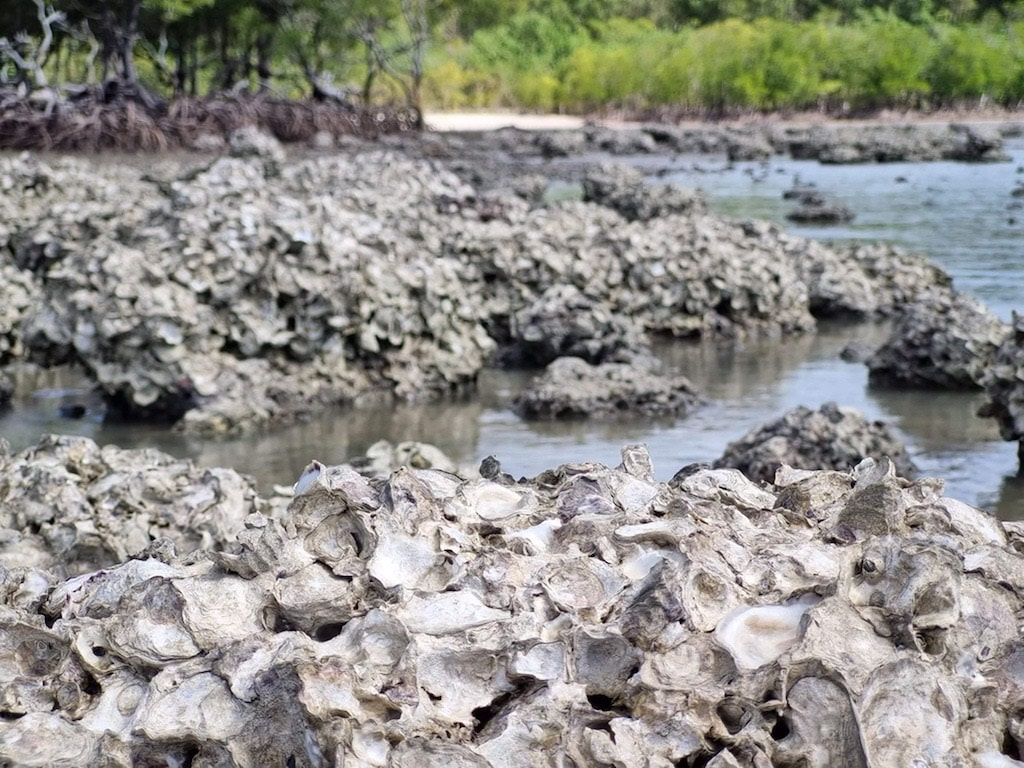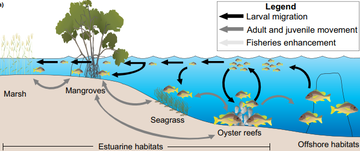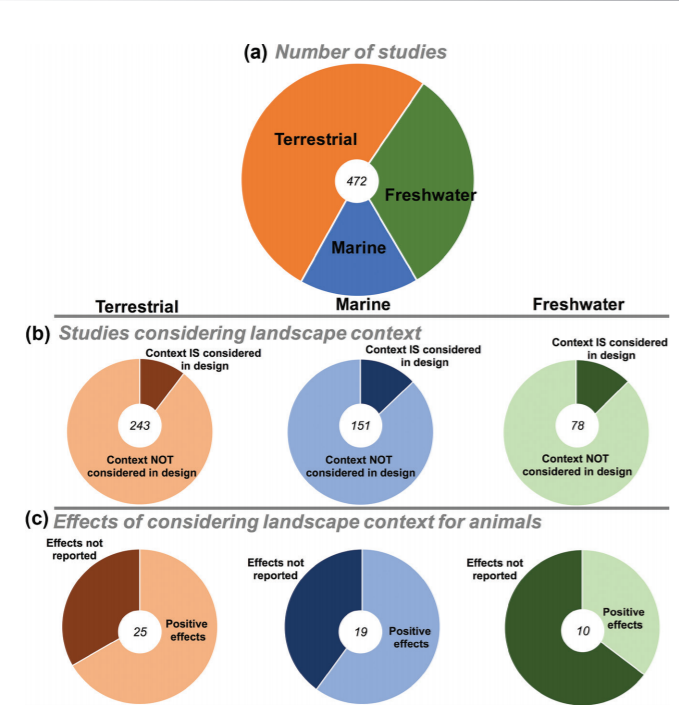Oyster Reefs
Feature publications |
|
Some like it hot: the ecology, ecosystem benefits and restoration potential of oyster reeds in tropical waters
Richardson et al. 2022 Frontiers in Marine Science
The focus on restoring shellfish reefs has been largely in cool temperate waters of the world. Yet oyster reefs have also suffered massive, widespread losses in tropical waters. This paper summarises all that is currently known about tropical shellfish reefs: their ecology, species diversity, ecosystem benefits, historical losses and current status. It provides colourful and clearly presented background to support emerging efforts to restore tropical shellfish reefs and recover the ecosystem services that they provide.
|
|
Maximizing the benefits of oyster reef restoration for finfish and their fisheries
Gilby et al. 2018 Fish and Fisheries
Global declines in oyster reefs have resulted in reduced habitat heterogeneity, extent and quality for some coastal finfish, potentially reducing fish populations and catches. It is well established that habitat restoration results in higher finfish biomass and diversity where oyster reefs replace bare substrata. Therefore, restoring oyster reefs with a view to also improving fish stocks is often a key goal of oyster restoration.
|
|
Spatial Restoration Ecology: Placing Restoration in a Landscape Context
Gilby et al. 2018 Bioscience
Researchers on conservation planning and practice have increasingly recognized and adopted the pivotal role of landscape attributes in shaping the effectiveness of protected areas. However, the degree to which these concepts have been integrated into habitat restoration projects has not been quantified. We reviewed the global literature and found that landscape context was considered in fewer than one in eight restoration projects in the selection of restoration sites (11% of 472 projects).
|
Oyster reef publications
Rod Connolly's publications relating to oyster reefs
2024
2022
2021
- Connolly RM, Herrera C, Rasmussen J, Buelow CA, Sievers M, Jinks KI, Brown CJ, Lopez-Marcano S, Sherman CDH, Martínez-Baena F, Martin B, Baring R, Reeves SE (2024) Estimating enhanced fish production on restored shellfish reefs using automated data collection from underwater videos. Journal of Applied Ecology 61:633-646 PDF
2022
- Richardson MA, Zhang Y, Connolly RM, Gillies CL, McDougall C (2022) Some like it hot: the ecology, ecosystem benefits and restoration potential of oyster reefs in tropical waters. Frontiers in Marine Science 9:873768 PDF
2021
- Gilby BL, Olds AD, Brown CJ, Connolly RM, Henderson CJ, Maxwell PS, Schlacher TA (2021) Applying systematic conservation planning to improve the allocation of restoration actions at multiple spatial scales. Restoration Ecology 29:13403 PDF
- Pittman SJ, Yates KL, Bouchet PJ, Alvarest-Berastegui D, Andrefouet S, Bell SS, Berkstrom C, Bostrom C, Brown CJ, Connolly RM, Devillers R, Eggleston D, Gilby BL, Gullstrom M, Halpern BS, Hidalgo M, Holstein D, Hovel K, Huettmann F, Jackson EL, James WR, Kellner JB, Kot CY, Lecours V, Lepczyk C, Nagelkerken I, Nekson J, Olds AD, Santos RO, Scales KL, Schneider DC, Schilling HT, Simenstad C, Suthers IM, Treml EA, Wedding LM, Yates P, Young M (2021) Seascape ecology: identifying research priorities for an emerging ocean sustainability science. Marine Ecology Progress Series 663:1-29 PDF
- Giffin AL, Brown CJ, Nalau J, Mackey BG, Connolly RM (2020) Marine and coastal ecosystem-based adaptation in Asia and Oceania: review of approaches and integration with marine spatial planning. Pacific Conservation Biology 27:104-117 PDF
- Lopez-Marcano S, Brown CJ, Sievers M, Connolly RM (2020) The slow rise of technology: computer vision techniques in fish population connectivity. Aquatic Conservation: Marine and Freshwater Ecosystems 31:210-217 PDF
- Waltham NJ, Elliott M, Lee SY, Lovelock C, Duarte CM, Buelow C, Simenstad C, Nagelkerken I, Claassens L, Wen CCK, Barletta M, Connolly RM, Gillies C, Mitsch WJ, Ogburn MB, Purandare J, Possingham H, Sheaves M (2020) UN Decade on Ecosystem Restoration 2021-2030: what chance for success in restoring coastal ecosystems? Frontiers in Marine Science 7:71 PDF
- Gilby BL, Olds AD, Connolly RM, Henderson CJ, Schlacher TA (2019) Seascape context modifies how fish respond to restored oyster reef structures. ICES Journal of Marine Science 76:1131-1139 PDF
- Duncan CK, Gilby BL, Olds AD, Connolly RM, Ortodossi NL, Henderson CJ, Schlacher TA (2019) Landscape context modifies the rate and distribution of predation around habitat restoration sites. Biological Conservation 237:97-104 PDF
- Gilby BL, Olds AD, Connolly RM, Henderson CJ, Schlacher TA (2018) Spatial restoration ecology: placing restoration in a landscape context. Bioscience 68:1007-1019 PDF
- Gilby BL, Olds AD, Peterson CH, Connolly RM, Voss CM, Bishop MJ, Elliott M, Grabowski JH, Ortodossi NL, Schlacher TA (2018) Maximising the benefits of oyster reef restoration for finfish and their fisheries. Fish and Fisheries 19:931-947 PDF


